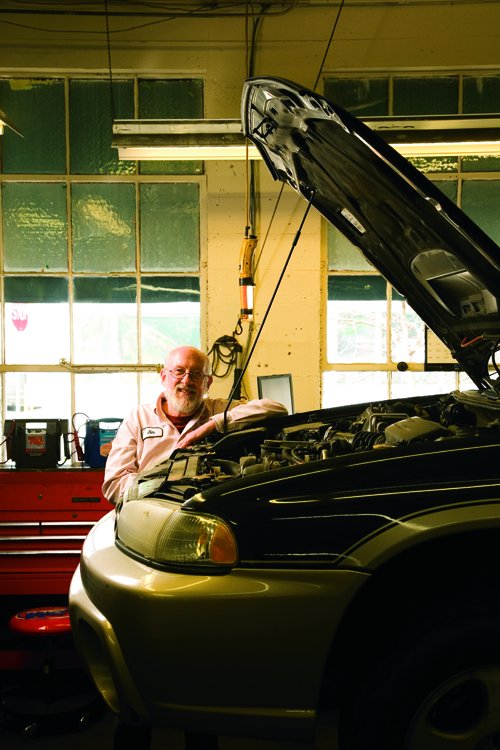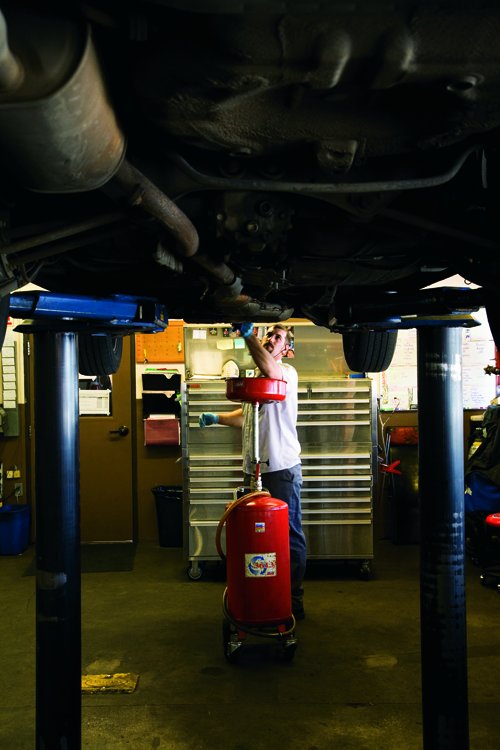 Oregon companies rely on green seals and local support groups to show there’s substance behind their sustainable business claims.
Oregon companies rely on green seals and local support groups to show there’s substance behind their sustainable business claims.
Jim Houser of Hawthorne Auto Clinic in Portland has greened every corner of his shop, from using locally re-refined motor oil to shuttling customers in hybrid cars. |
Oregon companies rely on green seals and local support groups to show there’s substance behind their sustainable business claims.
By Michelle V. Rafter/ Photos by Robbie McClaran
First came green, then greenwashing.
The country’s green movement has led some companies to slap eco-friendly labels on their goods and services without actually changing how they make products or operate their businesses.
For example, the head of a Portland green business program recounts walking into an area bakery recently and seeing a display of sustainable flour. When asked about it, the establishment’s owner “was annoyed,” the program manager says. “He said, ‘I had to put all that crap about sustainability out there because that’s what I have to do if I’m going to do business in Portland.”
“It wasn’t part of the company’s culture,” the program manager says. “That’s the ultimate greenwashing.”
In such a hype-filled environment, conscientious company owners are anxious to separate themselves from imposters by showing customers they talk the talk and walk the walk.
Their dilemma: figuring out the best way to do that without sounding like they’re greenwashing, too.
Some companies purposely don’t say much about what they do. “A lot of legitimate companies are scared to talk for fear of being labeled greenwashing,” says Simon Dunn, a sustainability business consultant from Vancouver, B.C., who spoke at a University of Oregon sponsored greenwashing forum earlier this year.
One answer is green seals, the little green logos that can be found on everything from laundry detergent to paper products to carpeting. By allowing an outside organization to monitor how its goods are produced or its business operates and then grant a seal of approval, a company can show there’s substance behind its green claims.
If it were just that simple. According to sustainability program monitors and other experts, the country’s green love affair has sprouted more than 350 green seal or eco-monitoring programs tracking 3,200 products, and not all are created equal. Some require companies to go through rigorous testing or annual inspection of their entire supply chain, but others are little more than window dressing. “No wonder greenwashing exists. Who’s able to keep track of all that?” says Peter Korchnak of Semiosis Communications, a Portland green marketing agency.
The key, according to local and national sustainability experts, is vetting seal programs to make sure there’s something behind the fancy green logos, and then picking the ones that best suit an individual company’s needs. Some Oregon companies opt to align themselves with local green seal programs because it’s easier to monitor the monitors and get involved in the process.
Luckily, companies don’t have to sort it all out by themselves. Thanks to Oregon’s well-developed network of sustainable business support groups and public agencies, company owners can get advice and support on just about every aspect of their green efforts.
Exaggerating claims is only one of the six sins of greenwashing that sustainability industry experts point to. Others: making products sound greener than they really are, making claims that are difficult to substantiate, and making claims that may be true but are irrelevant or inconsequential, such as claiming a product contains no ozone-depleting chlorofluorocarbons, which have been legally banned for 30 years.
In 2008, UO associate professor of advertising Kim Sheehan helped launch the Greenwashing Index to raise awareness of the issue. To date, consumers have posted more than 180 print, TV, radio and billboard display advertisements to the Greenwashing Index website, rating how well product claims stand up against greenwashing measures on a scale of 1 for “authentic” to 5 for “bogus.”
“Consumers get very upset over the use of the word green,” Sheehan explained at the greenwashing forum. “There’s no definition of what it means. It’s a real hot button.”
Business owners Jim Houser and Elizabeth Dally spent 26 years greening their Southeast
Hawthorne Auto Clinic has been honored for its ongoing sustainable business practices. |
Portland auto repair shop, Hawthorne Auto Clinic, and have gone to great lengths to document their efforts.
The irony of running a green business in an industry demonized as one of the world’s biggest polluters isn’t lost on Jim Houser. He’s even joked that he fixes “gas-guzzling, carbon monoxide-spewing hunks of metal.” But the couple’s quest to go green is no laughing matter. Houser and Dally have left no aspect of their 5,000-square-foot Hawthorne District repair shop unreformed, from using locally re-refined motor oil and anti-freeze to shuttling customers around in an electric hybrid car to buying carbon offsets.
True eco-conscious companies like Hawthorne Auto Clinic incorporate sustainability into their operations as well as their products and services, use local suppliers and extend their green practices to employees and customers, according to Robyn Shanti, coordinator of Sustainable Business Network, a Portland green business network. If a company is “great at lessening their impact on the environment, but doesn’t have the social-equity piece, if they’re not treating their employees equitably and paying them a living wage, to us that’s greenwashing,” she says.
One of the ways the 16-person Hawthorne Auto Clinic puts those concepts into practice is by buying carbon offsets from Climate Trust, the Portland-based nonprofit that runs an offset program for customers who commit to a year’s worth of regular maintenance. Last year the car shop paid a total of $3,000 for offsets, including $400 for itself and the balance for customers, Houser says.
The repair shop provides showers and bicycle racks for employees who ride to work and TriMet passes for bus riders. They’ve put four mechanics through training to work on hybrids and provided other training opportunities — one reason many on their crew have worked there a decade or longer.
To monitor their sustainable business practices, Houser and Dally work with the Pollution Prevention Outreach Team, a consortium of eight public agencies that oversees the Eco-Logical green seal program for Oregon auto shops and landscapers. Auto collision and repair shops that apply to the Eco-Logical seal program must comply with detailed standards developed by the consortium and the North American Auto Trades Association. They also must submit to an onsite visit by a team of PPOT inspectors that goes through a 21-page checklist before deciding whether the shop can earn the seal.
Houser and Dally opted to work with the local seal program because it’s well monitored, and as a local service provider, they know their customers would want it, Houser says. Also, “It made more sense to go with local programs because they’re investing in educating people locally,” he says.
The auto shop also voluntarily complies with standards that are stricter than those the Environmental Protection Agency requires for auto industry businesses of their size. They’re also active in Green America, a national nonprofit that promotes green business, and the city of Portland’s Bureau of Planning and Sustainability.
For companies that are serious about their green efforts, those types of associations can pay off. The Bureau of Planning and Sustainability recognized Hawthorne Auto Clinic with one of its Businesses for an Environmentally Sustainable Tomorrow (BEST) awards in 2008. “They’ve done an incredible job of taking a business not traditionally considered sustainable and identified opportunities for energy savings and efficiencies in ways a lot of businesses could learn from,” says Jaime Valdez, sustainability adviser for the city’s BEST Business Center, which supports local businesses’ green efforts.
Green’s not just something Hawthorne Auto Clinic does as an afterthought, adds Heidi Kahn, a senior planner at Metro’s Sustainability Center and 2008 BEST award judge. “It’s very much a part of who they are,” she says.
In addition to local green seal programs, Oregon companies can get help from a variety of private and public agencies. Besides sponsoring the BEST awards, Portland’s Bureau of Planning and Sustainability offers free evaluations of companies’ energy consumption, recycling and business operations, and steers them to agencies that give out cash incentives, rebates and loans for green upgrades.
Companies that join the Sustainable Business Network of Portland have to meet standards that are stringent even by green standards. Companies must be locally owned and keep as much of their purchasing and sales in the local economy as possible “so there’s a recirculating business effect,” Shanti says. “That makes them automatically sustainable in our opinion.”
Last year the Sustainable Business Network of Portland began a monthly tour of one member’s facilities, a show and tell of green strategies to help other companies ramp up their own efforts. The tour has visited a restaurant, grocery co-op, furniture store and mortgage office. The organization’s also videotaped six of its members talking about their sustainable practices “so people can hear from the horse’s mouth how they did it, and how they communicate that with their customers,” says Shanti.
Both the Sustainable Business Network of Portland and The Rogue Initiative for a Vital Economy (THRIVE), based in Ashland, belong to a national network of 70 local sustainable business support groups. Along with its other efforts, THRIVE promotes sustainable agricultural practices and collaborations between Southern Oregon farmers, ranchers, chefs and food processors.
Elsewhere in the state, organizations such as the Oregon Environmental Council and UO’s Institute for a Sustainable Environment offer workshops and other training on sustainable business practices. This spring, the OEC hosted a series of day-long seminars on low-impact development and storm-water retention for contractors and developers in Eugene, Medford, Grants Pass and Central Point. In April, the institute kicked off Climate Masters at Work, a 10-week course to teach small- and mid-sized businesses how to cut energy consumption. As part of the course, companies have to spend 25 hours doing a greenhouse gas inventory of their business and sharing the results with business partners or with a community business group.
Despite all the available local and national resources, companies that have comprehensive plans for greening their products and business practices are still a rarity, says Valdez, with Portland’s BEST Business Center.
In the long run, going green isn’t just good for the environment and the community, it’s good for business, Valdez says. By using solar power or other forms of alternative power, companies can reduce their energy bills “and on days that they’re not even open they can be generating power and putting it back on the grid,” he says. “In recycling and reducing waste, it reduces the number of visits a waste hauler has to make,” and that saves money.
Besides helping themselves, what companies like Hawthorne Auto Clinic have done is show other small businesses that environmental consciousness isn’t some abstract concept and isn’t greenwashing, but is something they can accomplish. “People can see it doesn’t have to be this big, dramatic, huge change,” says Shanti. “It can be done in smaller increments.”



